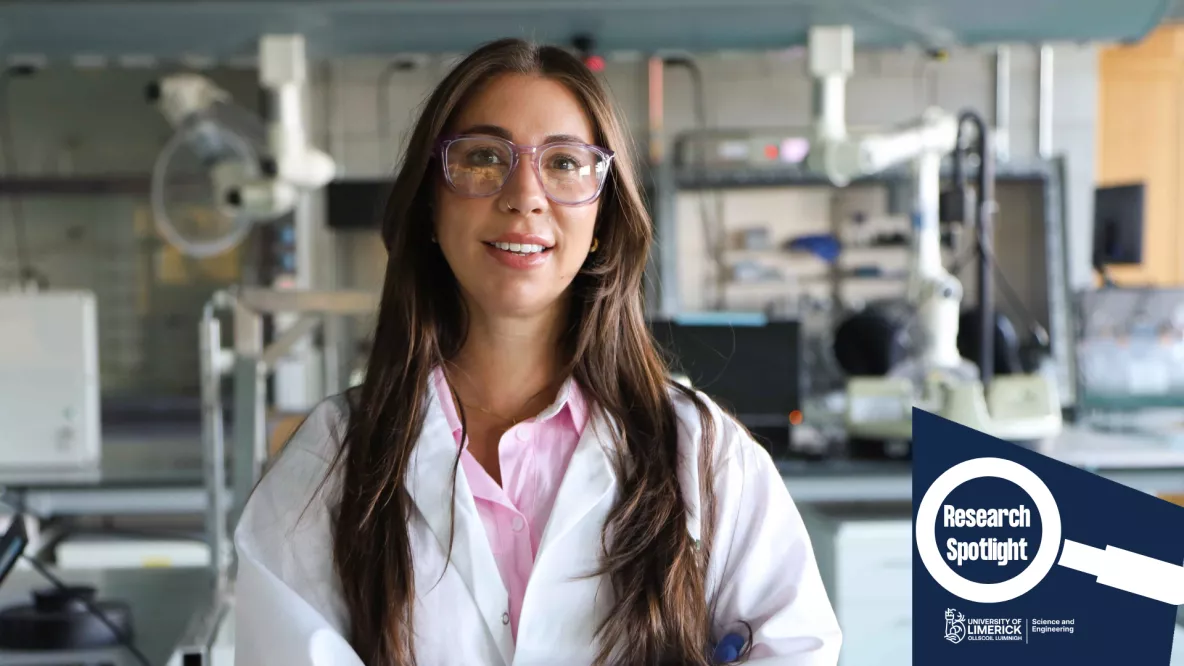

Dublin native Dr Olwyn Mahon is a Senior Research Fellow in the Faculty of Science and Engineering at University of Limerick.
Developing a fascination with the human body at a young age, this curiosity influenced her career path and areas of study as she progressed though her education. First choosing to pursue an undergraduate degree in Neuroscience and then taking an interdisciplinary focus for both her MSc and PhD between the Immunology and Biomedical Engineering Department at Trinity College Dublin.
“I really loved learning about the brain and its complexities. When I went on to do my Masters in Immunology, I got an opportunity to work on a project between the Immunology and Biomedical Engineering Department. Interdisciplinary was definitely something that was of interest to me, trying to figure out new ways that we could merge two fields together to answer questions that they couldn't really answer alone was interesting.”
This project developed into a PhD idea for Olwyn which focused on the area of bone regeneration.
“For my PhD, we looked at developing orthopaedic implants that drove the right type of the immune response and wouldn’t be rejected. This smart material we were developing for the implant would instruct the immune system to turn on the right cells, the right proteins, and heal a little bit faster, to almost push the immune system to help the bone to regenerate.”
Olwyn wanted to continue to pursue a career in the science research field but felt she could use what she had learned to advance developments in other areas. This led her to write a 2-year Irish Research Council Postdoctoral Fellowship application and come to the University of Limerick to work in cancer research.
“I moved to UL to work on cancer 3D disease models, using what I knew about how to make complex systems or 3D models and how they interact with the cells. It intrigued me because cancer was a very different disease to my research area, and I wanted to know more about how I could utilise my skillset to answer novel research questions .”
After this Olwyn joined Associate Professor Eoghan Cunnane’s Biomedical Engineering laboratory as a McCarron Research Fellow in the Bernal Institute which primarily focuses on Biomedical Engineering for disease applications. While Eoghan’s work focuses on male infertility, there was scope for them to work together to model urological cancers. It was around this time that she received a Fulbright Scholarship to go to the Dana-Farber Cancer Institute, a leading US cancer centre and research institute of Harvard Medical School.
“The project was to integrate what I knew about disease modelling and how I could apply it to a clinical cancer research lab, so it was a real learning curve. I was around so many top medical oncologists and it was great to see the work that they do because it forces you to think in a way that you haven't had to think before.”
This experience encouraged Olwyn to apply for another international placement, this time as a Marie Skłodowska-Curie Fellow. The Fellowship will allow her to spend two years in a lab outside Europe and then return to UL. She decided to go back to working with bone models but this time to focus on bone metastatic cancer, or cancers that spread from other organs to the bone.
“It was applying everything I know about bone dynamics, the immune system in bone regulation, and understanding how bone metastatis develops in cancers like bladder cancer. It really interested me because you're not thinking just as a cancer biologist. You are also having to think about being a bone immunologist.”
Professor Gordana Vunjak-Novakovics, a world-leader in tissue engineering, based in The Biomedical Engineering Department of Columbia University, New York will host Olwyn’s Fellowship project. The project focuses specifically on bladder cancer and the differences between males and females with bladder cancer, a relatively underexplored research area.
“Bladder cancer is quite difficult to treat, but also there's a real gender disparity between males and females, who present with very different disease and prognosis. We are trying to understand any hormone regulations in the initiation or progression of this cancer. For this project, we will develop an in vitro mini bladder and bone system, called organ-on a-chip system, to see what makes it move from the bladder to the bone. It is hoped that this will better inform an approach for precision oncology and patient-specific treatments for this type of metastatic cancer for both men and women”
Reflecting on her career so far, Olwyn is an advocate for the potential opportunities that research can bring.
“I think being a researcher allows you the freedom to pursue what you think is interesting and exciting, to travel internationally and to experience new approaches to research. This makes people better, open-minded research scientists because you are exposed to a different way of critical thinking and experimental methodologies and processes when you are in another research lab. You can't just work in your own way; especially with the need for interdisciplinary work in science nowadays, you have to mould yourself to several approaches and gain lateral thinking and there are significant learnings in this.”
Postal Address: Science & Engineering Faculty Office, Lonsdale Building, 1st Floor, University of Limerick, Limerick, Ireland
Email: scieng@ul.ie
Phone: +353 (0)61 202109 or +353 (0)61 202642